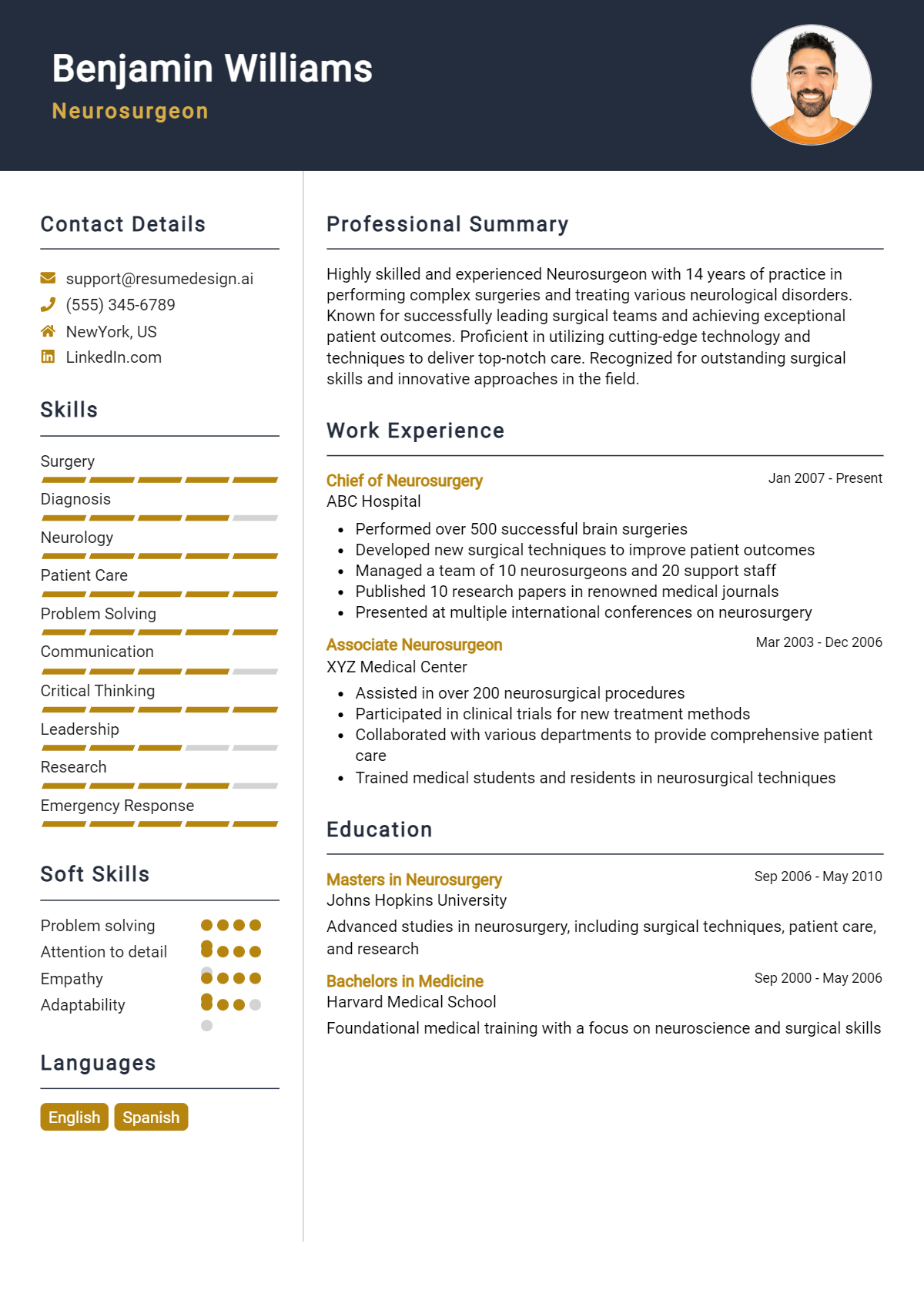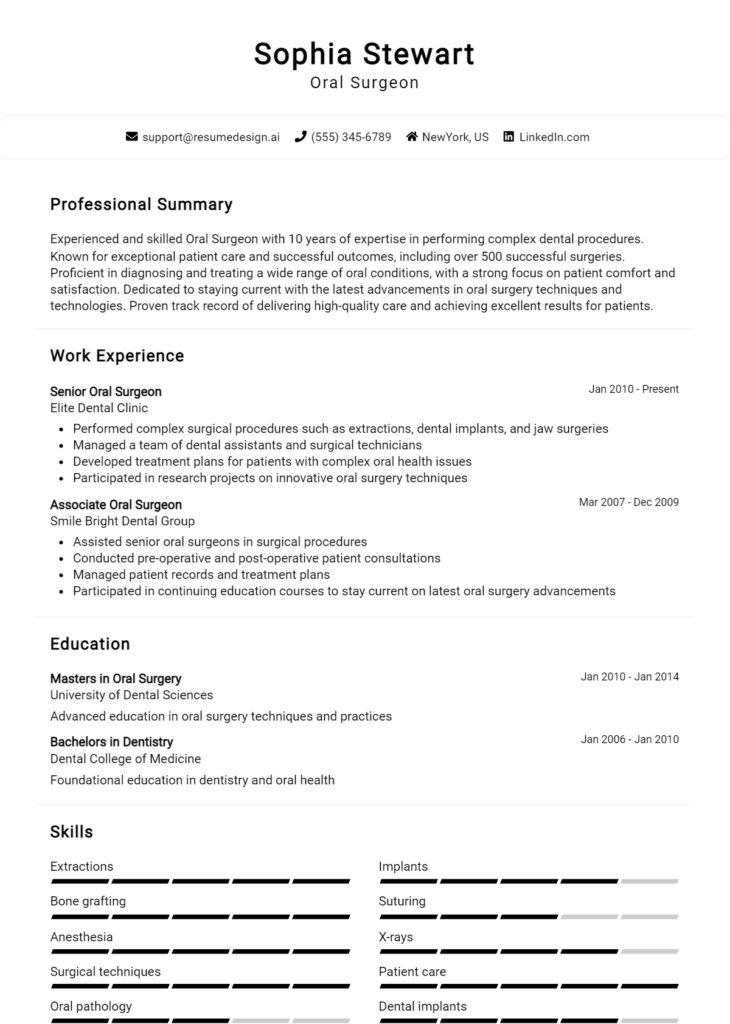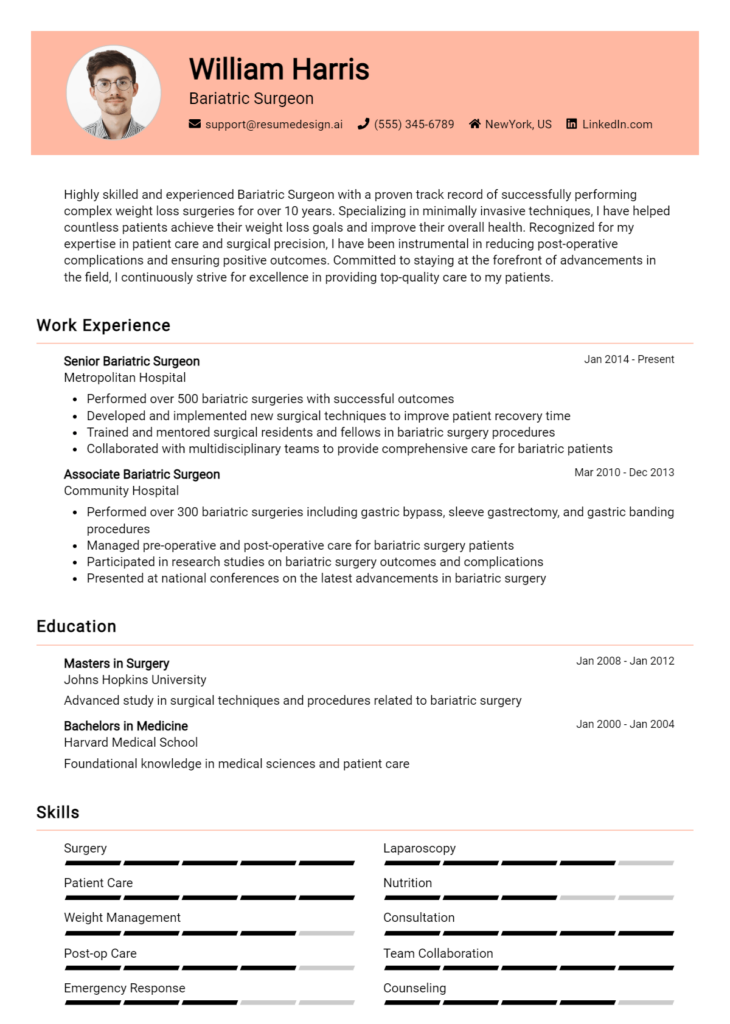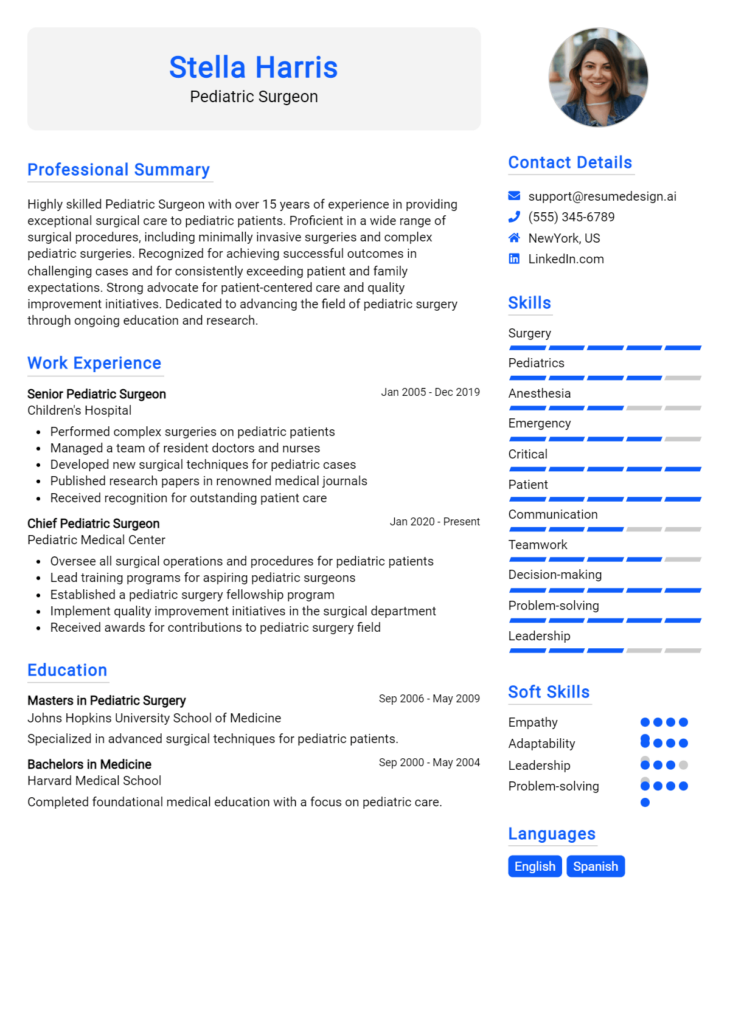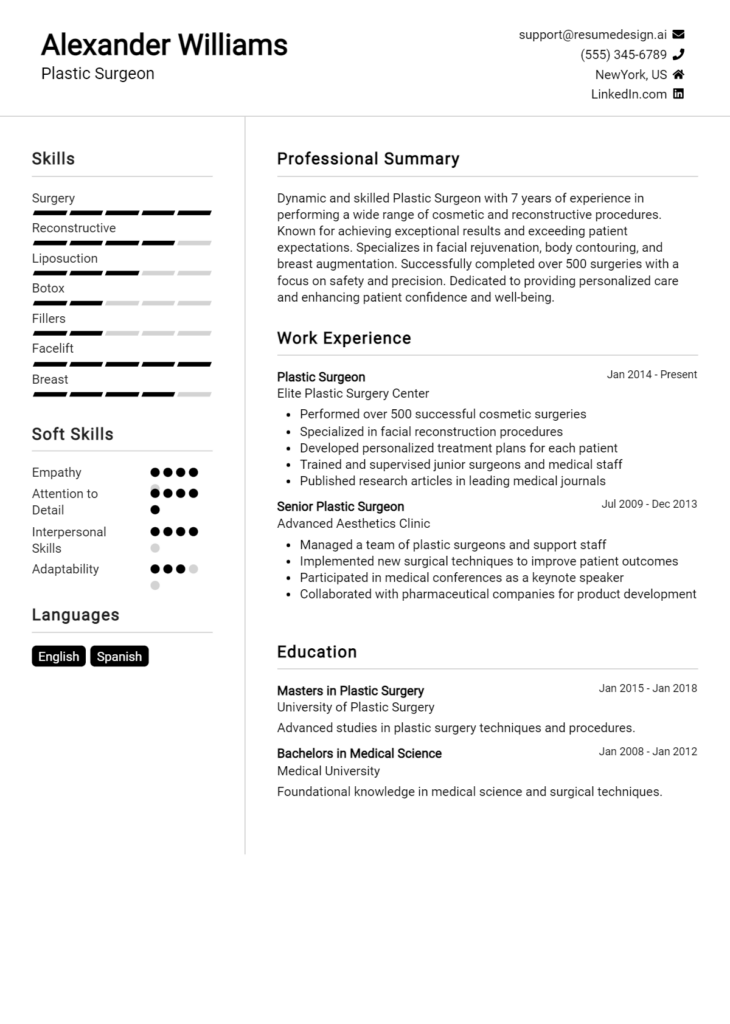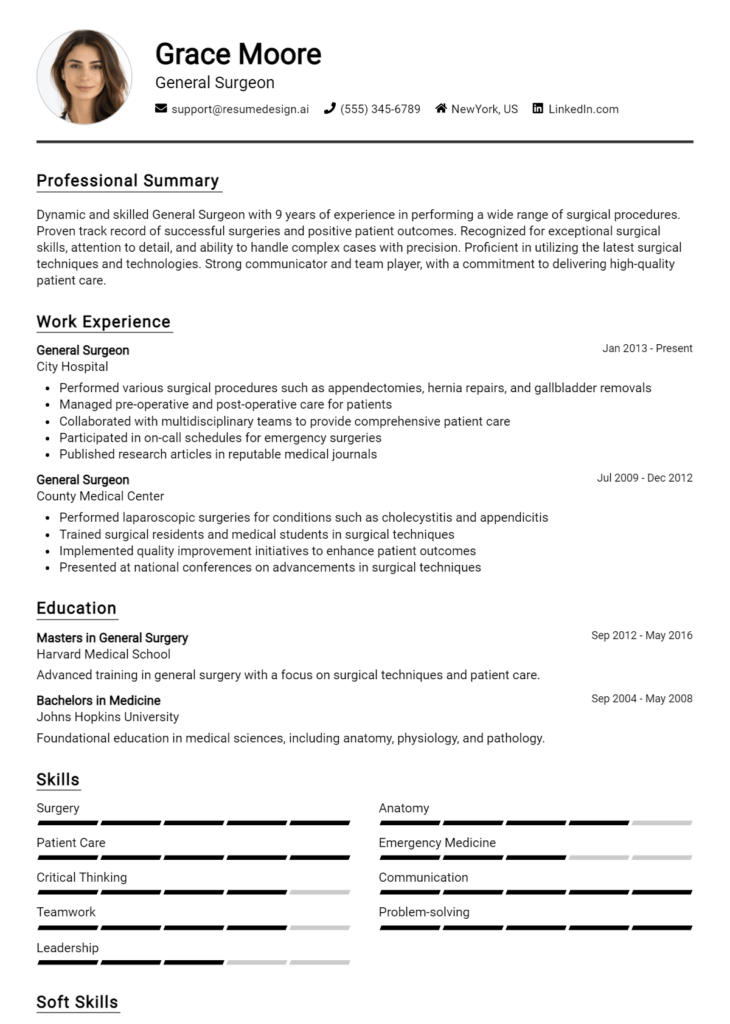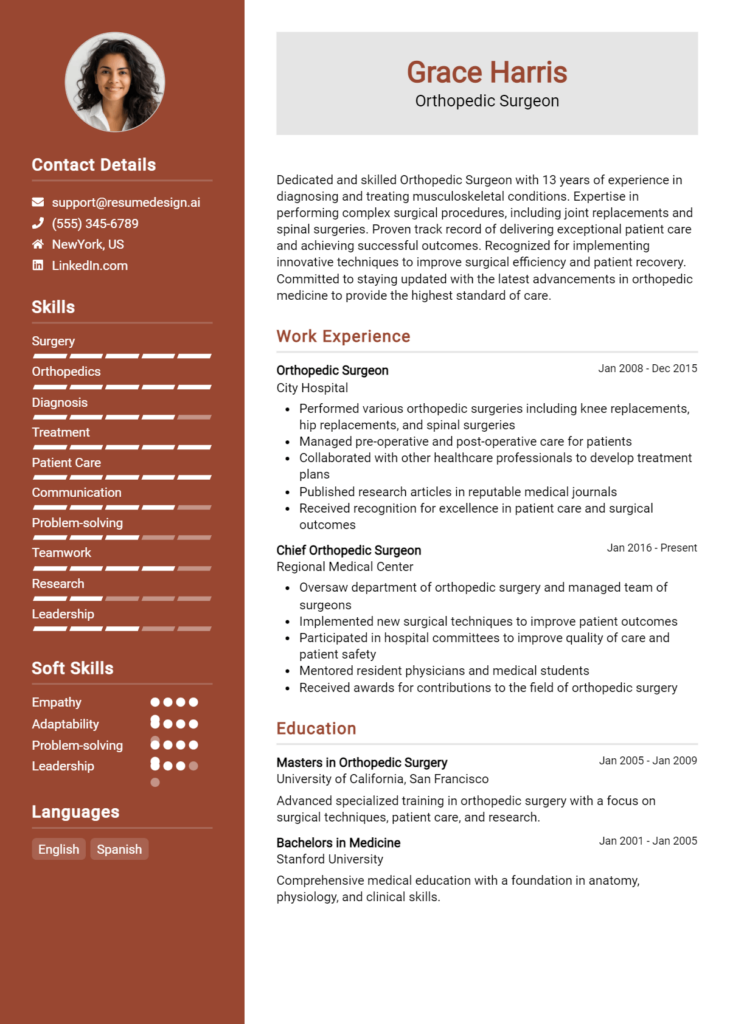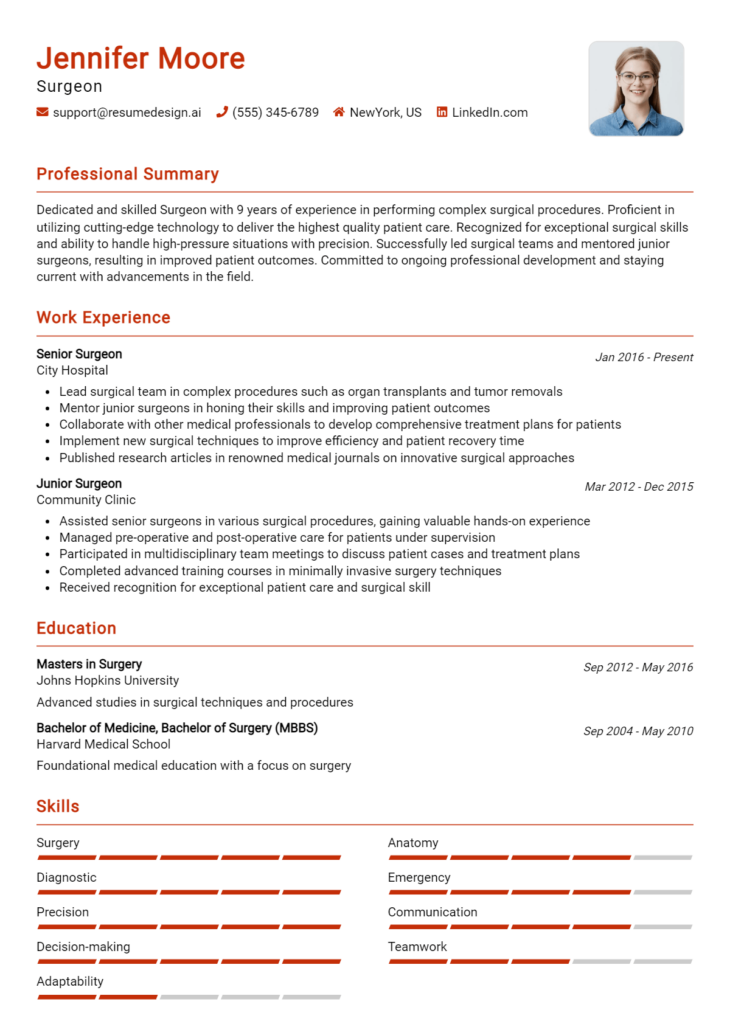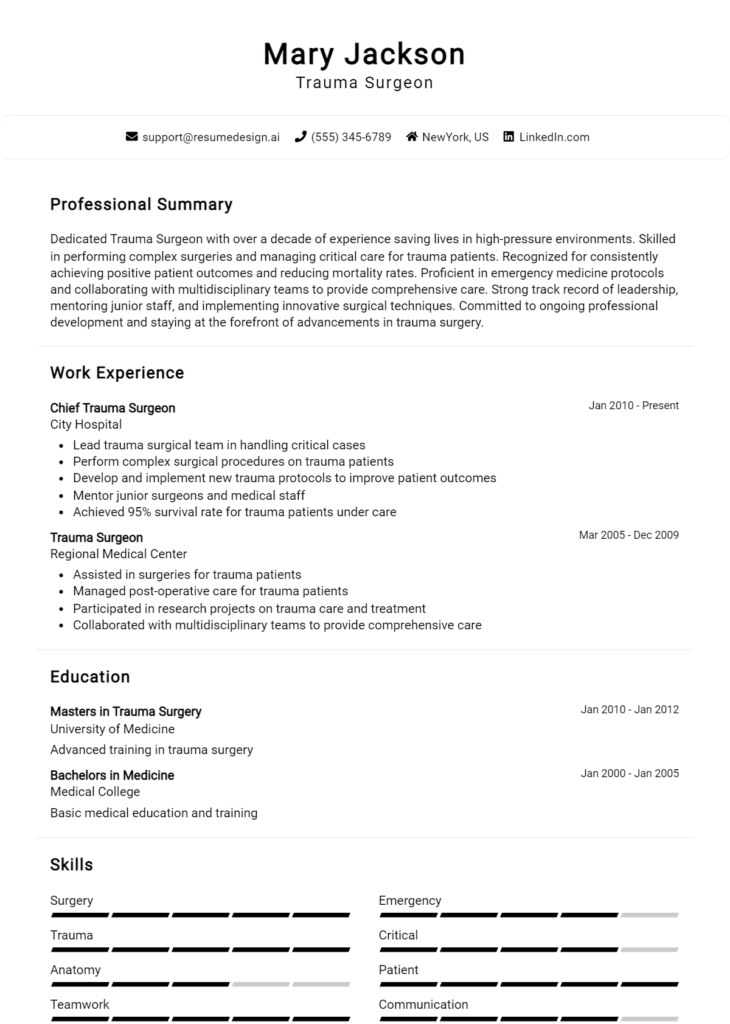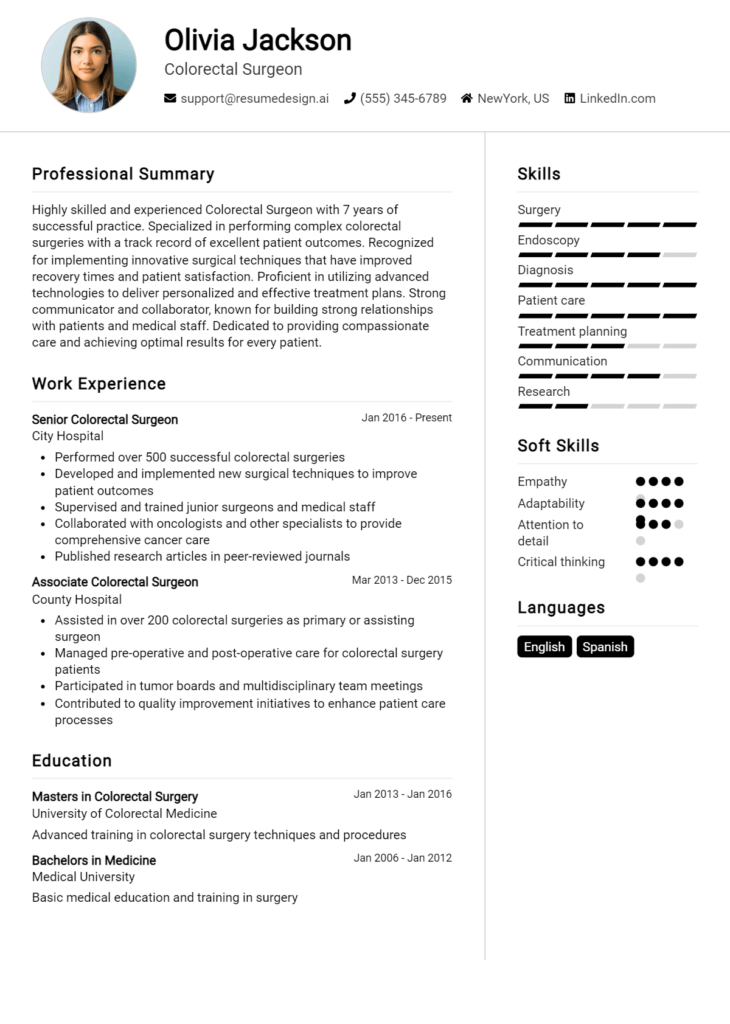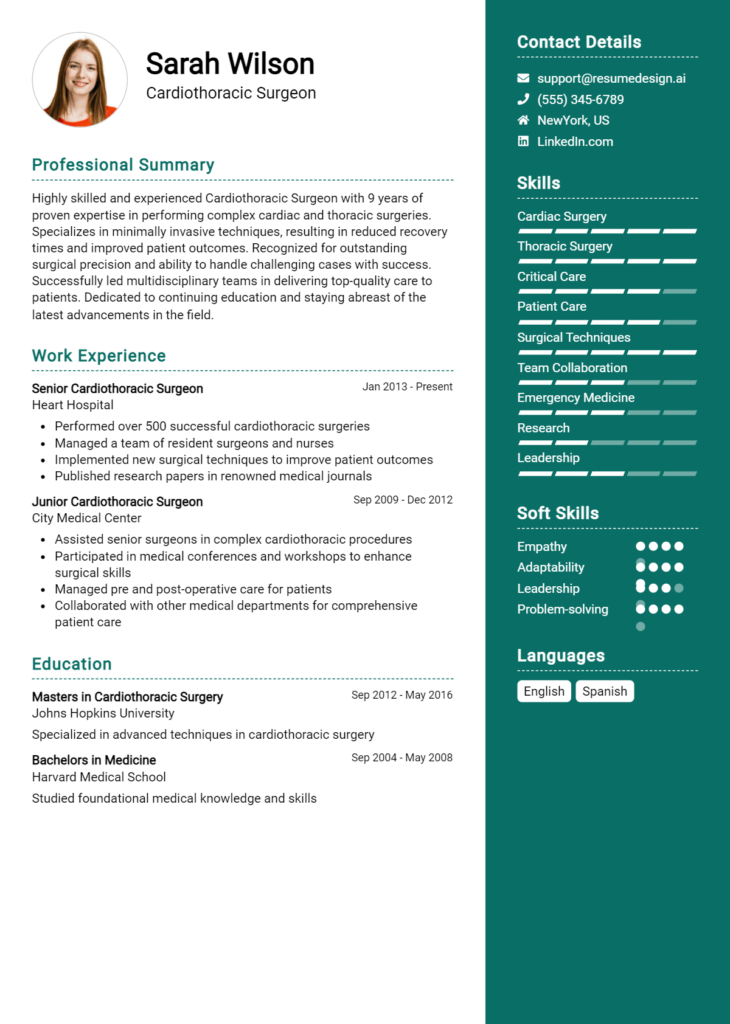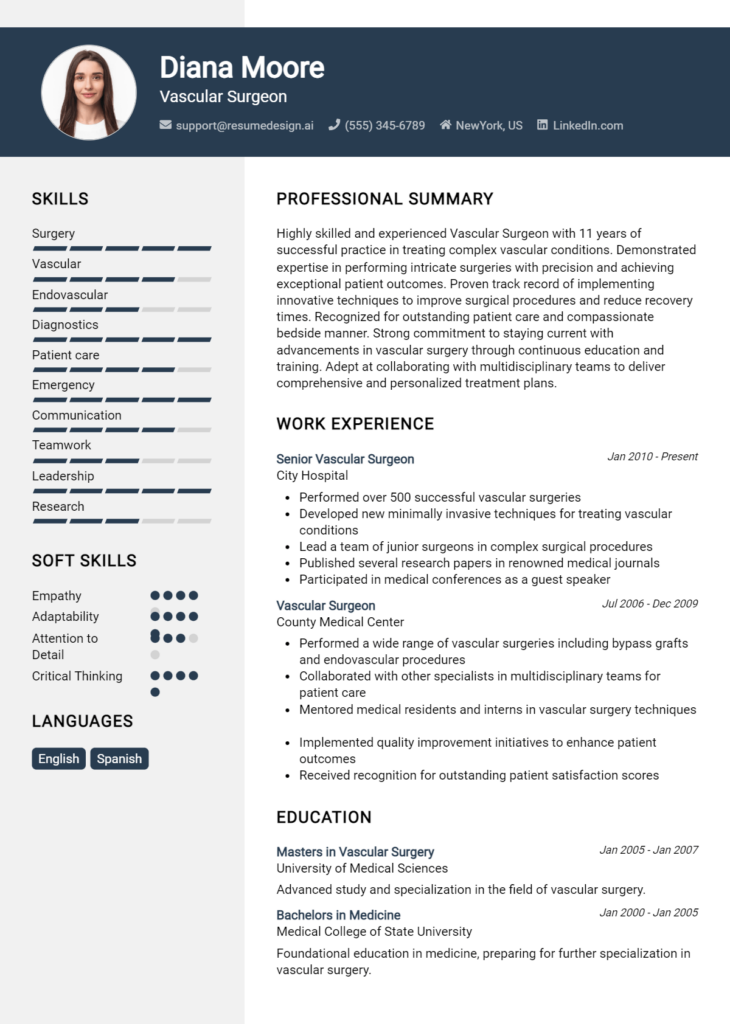Neurosurgeon Core Responsibilities
A Neurosurgeon plays a critical role in diagnosing and treating conditions affecting the brain, spine, and nervous system. Key responsibilities include performing complex surgical procedures, collaborating with multidisciplinary teams, and conducting patient assessments. Essential skills involve technical proficiency in surgical techniques, operational insight into healthcare systems, and strong problem-solving abilities to address intricate neurological issues. A well-structured resume effectively highlights these qualifications, aligning with the organization's goals for patient care and innovative solutions.
Common Responsibilities Listed on Neurosurgeon Resume
- Performing intricate neurosurgical procedures.
- Diagnosing neurological conditions through examinations and imaging.
- Collaborating with neurologists, radiologists, and other specialists.
- Developing surgical plans tailored to individual patient needs.
- Monitoring and managing postoperative care and recovery.
- Conducting research to advance neurosurgery techniques.
- Educating patients and families about treatment options.
- Maintaining accurate and detailed patient records.
- Participating in surgical teams and hospital committees.
- Staying updated with advancements in neurosurgery.
- Ensuring compliance with healthcare regulations and protocols.
High-Level Resume Tips for Neurosurgeon Professionals
A well-crafted resume is an essential tool for Neurosurgeon professionals, as it serves as the first impression candidates make on potential employers. In a highly competitive field where precision, expertise, and a proven track record are paramount, your resume must effectively reflect not only your skills and qualifications but also your significant achievements. A compelling resume can set you apart from other qualified candidates, showcasing your unique contributions to the medical field. This guide will provide practical and actionable resume tips specifically tailored for Neurosurgeon professionals, ensuring that your application stands out and captures the attention of hiring committees.
Top Resume Tips for Neurosurgeon Professionals
- Tailor your resume to align with the specific job description, using keywords from the posting to demonstrate your fit.
- Highlight relevant experience, including fellowships, residencies, and specialized training pertinent to neurosurgery.
- Quantify your achievements where possible, such as the number of surgeries performed or improvements in patient outcomes.
- Showcase your technical skills, including proficiency in advanced surgical techniques and use of neurosurgical equipment.
- Emphasize your research contributions, publications, and presentations at conferences to reflect your commitment to the field.
- Include any board certifications and affiliations with professional organizations that bolster your qualifications.
- Utilize a clear and professional format, ensuring that your resume is easy to read and visually appealing.
- Incorporate a summary statement at the top that encapsulates your career objectives and key qualifications.
- Consider including patient testimonials or case studies that highlight your impact on patient care and outcomes.
By implementing these tips, you can significantly enhance your resume and increase your chances of landing a job in the Neurosurgeon field. A well-structured and focused resume not only showcases your expertise but also demonstrates your dedication to advancing in this challenging and rewarding profession. With the right presentation of your skills and achievements, you can capture the attention of hiring managers and take a significant step towards your dream role.
Why Resume Headlines & Titles are Important for Neurosurgeon
In the competitive field of neurosurgery, a well-crafted resume headline or title serves as the first impression a candidate can make on hiring managers. These headlines are essential as they encapsulate a candidate's key qualifications and expertise in a succinct and impactful manner. A strong headline can immediately grab attention, summarizing the applicant's unique strengths and aligning them with the job's requirements. It should be concise, relevant, and directly related to the position being applied for, allowing hiring managers to quickly assess the candidate's fit for the role.
Best Practices for Crafting Resume Headlines for Neurosurgeon
- Keep it concise: Aim for a headline that is no more than 10-15 words.
- Be specific: Include relevant keywords that reflect your expertise in neurosurgery.
- Highlight key achievements: Mention significant accomplishments that showcase your skills.
- Use active language: Choose powerful action verbs to convey your strengths.
- Tailor to the job: Customize your headline for each application to match the job description.
- Focus on specialties: If applicable, mention specific areas of neurosurgery you excel in.
- Maintain professionalism: Ensure the tone is formal and appropriate for the medical field.
- Avoid jargon: Use clear, straightforward language that can be understood by all readers.
Example Resume Headlines for Neurosurgeon
Strong Resume Headlines
Board-Certified Neurosurgeon Specializing in Minimally Invasive Techniques
Experienced Neurosurgeon with a Proven Record in Complex Spinal Surgeries
Neurosurgeon with 10+ Years of Experience in Pediatric Neurology
Dedicated Neurosurgeon Committed to Advancing Patient Care and Research
Weak Resume Headlines
Neurosurgeon Seeking Job
Experienced Doctor in Surgery
The strong resume headlines are effective because they are specific, highlight relevant expertise, and convey a clear value proposition that aligns with the role of a neurosurgeon. They immediately provide hiring managers with insight into the candidate's qualifications and areas of specialization. In contrast, the weak headlines fail to impress due to their vagueness and lack of focus, making it difficult for employers to discern the candidate's unique abilities or professional background. A strong, targeted headline can set the stage for a compelling resume that captures the attention of hiring decision-makers.
Writing an Exceptional Neurosurgeon Resume Summary
A resume summary is a critical component for a Neurosurgeon’s application, serving as a powerful introduction that captures the attention of hiring managers. In a highly specialized field like neurosurgery, a strong summary highlights key skills, relevant experience, and notable accomplishments, allowing candidates to stand out in a competitive job market. A well-crafted summary should be concise, impactful, and tailored to the specific job role, ensuring that it resonates with the needs of the hiring institution and effectively communicates the candidate's qualifications.
Best Practices for Writing a Neurosurgeon Resume Summary
- Quantify achievements: Use specific numbers and metrics to demonstrate your impact, such as the number of surgeries performed or patient success rates.
- Focus on relevant skills: Highlight essential skills such as surgical precision, patient management, and advanced medical knowledge.
- Tailor the summary: Customize your summary for each job application, reflecting the specific requirements and responsibilities outlined in the job description.
- Keep it concise: Aim for 3-5 sentences that deliver a clear and focused message about your qualifications.
- Use action verbs: Start sentences with strong action verbs to convey confidence and proactivity.
- Incorporate keywords: Use relevant industry terminology and keywords that align with the job posting to pass through applicant tracking systems.
- Showcase soft skills: Mention interpersonal skills like communication, empathy, and teamwork that are vital in the medical field.
- Highlight continuous education: Include any recent certifications or training that demonstrate a commitment to professional development.
Example Neurosurgeon Resume Summaries
Strong Resume Summaries
Board-certified neurosurgeon with over 10 years of experience in performing intricate brain and spinal surgeries. Successfully led a surgical team that achieved a 95% patient recovery rate over 500 complex procedures. Passionate about advancing neurosurgical techniques through ongoing research and collaboration.
Dedicated neurosurgeon with expertise in minimally invasive techniques, contributing to a 40% reduction in patient recovery time. Recognized for excellence in patient care and communication, successfully managing a diverse caseload of over 300 surgeries annually.
Experienced neurosurgeon proficient in advanced neuroimaging and intraoperative monitoring, resulting in improved surgical outcomes. Played a key role in a multi-disciplinary team, leading to a 30% increase in successful patient referrals and a 20% decrease in post-operative complications.
Weak Resume Summaries
Neurosurgeon with many years of experience looking for a new opportunity in a hospital setting.
Skilled surgeon interested in helping patients with brain issues. I have worked in various hospitals and have performed surgeries.
The strong resume summaries are compelling because they quantify achievements, specify relevant skills, and demonstrate a direct connection to the role of a neurosurgeon. They provide clear evidence of the candidate's impact and commitment to excellence in their field. In contrast, the weak summaries lack specificity and fail to convey the candidate's qualifications, making them less impactful and memorable to hiring managers.
Work Experience Section for Neurosurgeon Resume
The work experience section of a Neurosurgeon resume is vital as it serves as a comprehensive showcase of the candidate's technical skills, leadership abilities, and dedication to delivering high-quality patient care. This section not only highlights the specific surgical procedures and techniques mastered by the candidate but also emphasizes their capacity to manage surgical teams and collaborate with multidisciplinary professionals. By quantifying achievements and aligning their experience with industry standards, candidates can effectively demonstrate their value and readiness for the challenges of a neurosurgical role.
Best Practices for Neurosurgeon Work Experience
- Clearly outline specific surgical procedures performed, including the types of cases handled.
- Include quantifiable results, such as patient recovery rates or reduction in complication rates.
- Highlight leadership roles taken in surgical teams or clinical settings.
- Demonstrate collaboration with other healthcare professionals and departments.
- Use action verbs and concise language to convey achievements effectively.
- Align experiences with current neurological standards and advancements in the field.
- Showcase continuous education and training relevant to neurosurgery.
- Emphasize involvement in research or clinical trials that contribute to advancements in neurosurgery.
Example Work Experiences for Neurosurgeon
Strong Experiences
- Performed over 300 complex craniotomies with a 98% success rate, significantly reducing patient recovery time by 20%.
- Led a multidisciplinary team in a high-stakes surgery that resulted in a 15% reduction in postoperative complications compared to previous years.
- Implemented a new surgical technique that improved patient outcomes, demonstrated by a 30% increase in patient satisfaction scores.
- Collaborated with a research team on a clinical trial that resulted in a groundbreaking publication on minimally invasive techniques in neurosurgery.
Weak Experiences
- Assisted in surgeries and managed patients.
- Worked in a hospital setting for several years.
- Participated in team meetings and discussions.
- Treated various neurological conditions.
The examples listed as strong experiences are considered impactful because they provide specific metrics and outcomes that demonstrate the candidate's effectiveness and leadership in neurosurgery. They articulate clear achievements and contributions to both patient care and the medical field. In contrast, the weak experiences lack detail and quantifiable results, making them less compelling to potential employers. They do not provide a strong sense of the candidate's capabilities or contributions, which diminishes their appeal in a competitive job market.
Education and Certifications Section for Neurosurgeon Resume
The education and certifications section of a Neurosurgeon resume is crucial as it showcases the candidate's academic background, specialized training, and commitment to continuous learning in a highly competitive field. This section not only highlights relevant degrees but also emphasizes industry-recognized certifications and any specialized coursework that enhances the candidate's expertise. By providing detailed information about their educational journey and professional development, candidates can significantly bolster their credibility and demonstrate their alignment with the specific demands of the neurosurgery role.
Best Practices for Neurosurgeon Education and Certifications
- Include all relevant degrees, such as Doctor of Medicine (MD) or Doctor of Osteopathic Medicine (DO).
- List board certifications from recognized medical boards, like the American Board of Neurological Surgery.
- Detail any specialized training or fellowships in neurosurgery or related fields.
- Highlight coursework that directly relates to neurosurgery, including anatomy and surgical techniques.
- Ensure the format is clear and easy to read, using bullet points for quick reference.
- Keep the information up-to-date, removing any expired or irrelevant certifications.
- Include honors or distinctions received during your academic career to further establish credibility.
- Consider adding continuing education courses that reflect ongoing professional development.
Example Education and Certifications for Neurosurgeon
Strong Examples
- Doctor of Medicine (MD), Harvard Medical School, 2015
- Board Certified in Neurological Surgery, American Board of Neurological Surgery, 2018
- Fellowship in Pediatric Neurosurgery, Johns Hopkins University, 2019
- Advanced Surgical Techniques in Neurosurgery, Course completed, 2020
Weak Examples
- Bachelor of Arts in Psychology, State University, 2010
- Certification in Basic Life Support (BLS), Expired 2021
- General Surgery Residency, Completed 2016 (not specific to neurosurgery)
- Introduction to Neuroscience Course, Online, 2018
The strong examples are considered effective because they directly relate to the qualifications and skills required for a neurosurgeon, showcasing advanced degrees, specialized training, and current certifications that affirm the candidate's expertise. In contrast, the weak examples lack relevance to the neurosurgery field, include outdated or irrelevant qualifications, and do not emphasize the specialized training necessary to excel in this demanding role.
Top Skills & Keywords for Neurosurgeon Resume
As a neurosurgeon, possessing the right skills is crucial not only for successful surgical outcomes but also for ensuring patient safety and comfort. A well-crafted resume that highlights both hard and soft skills is essential for standing out in this highly competitive field. Neurosurgeons must demonstrate a blend of technical expertise and interpersonal abilities to effectively collaborate with medical teams, communicate with patients, and navigate the complexities of the human brain. Therefore, when crafting your resume, it is vital to focus on showcasing these skills to reflect your proficiency and dedication to neurosurgery. For further insights on how to effectively present your skills, check out this guide on skills.
Top Hard & Soft Skills for Neurosurgeon
Soft Skills
- Communication: Ability to convey complex medical information clearly to patients and families.
- Empathy: Understanding and addressing patient emotions and concerns.
- Teamwork: Collaborating effectively with surgical teams and other healthcare professionals.
- Problem-solving: Quickly assessing situations and making informed decisions during surgeries.
- Adaptability: Adjusting to changing situations and unexpected challenges in the operating room.
- Leadership: Guiding and mentoring junior staff and medical students.
- Attention to Detail: Ensuring precision in every aspect of surgical procedures.
- Stress Management: Maintaining composure in high-pressure environments.
- Critical Thinking: Analyzing complex data and making sound clinical judgments.
- Time Management: Balancing multiple responsibilities efficiently.
Hard Skills
- Surgical Techniques: Proficiency in various neurosurgical procedures and interventions.
- Anatomical Knowledge: In-depth understanding of the human nervous system and brain structure.
- Diagnostic Skills: Ability to interpret imaging studies such as MRIs and CT scans.
- Technology Proficiency: Familiarity with surgical instruments and medical technology used in neurosurgery.
- Patient Assessment: Skills in evaluating and diagnosing neurological conditions.
- Postoperative Care: Knowledge of managing patient recovery and potential complications.
- Research Skills: Ability to conduct clinical research and stay updated on advancements in the field.
- Regulatory Knowledge: Understanding of healthcare laws and regulations pertaining to neurosurgery.
- Emergency Response: Skills in handling life-threatening situations effectively.
- Documentation: Proficiency in maintaining accurate patient records and surgical documentation.
By emphasizing these critical skills in your resume, you can effectively demonstrate your qualifications and commitment to the field of neurosurgery. Additionally, don’t forget to highlight your work experience to provide context and depth to your expertise.
Stand Out with a Winning Neurosurgeon Cover Letter
Dear [Hiring Manager's Name],
I am writing to express my interest in the Neurosurgeon position at [Hospital/Clinic Name], as advertised on [Job Listing Source]. With a comprehensive background in neurosurgery and a passion for advancing patient care, I am excited about the opportunity to contribute my skills and expertise to your esteemed team. My training at [Medical School/Residency Program] has equipped me with a robust foundation in both surgical techniques and patient management, allowing me to deliver exceptional outcomes in a variety of complex cases.
Throughout my career, I have demonstrated a strong commitment to patient-centered care, emphasizing thorough pre-operative assessments and personalized treatment plans. At [Previous Institution/Practice], I successfully managed a diverse caseload, performing intricate procedures such as tumor resections, spinal surgeries, and minimally invasive techniques. My collaborative approach to treatment has fostered strong relationships with multidisciplinary teams, ensuring comprehensive care for my patients. Additionally, my involvement in clinical research has allowed me to stay at the forefront of emerging technologies and trends in neurosurgery, which I am eager to bring to [Hospital/Clinic Name].
I am particularly drawn to [Hospital/Clinic Name] due to its reputation for innovative approaches in neurosurgical care and its commitment to community outreach. I believe that my dedication to both surgical excellence and compassionate patient care aligns perfectly with your institution’s values. I am excited about the opportunity to contribute to your team and to help enhance the quality of life for patients facing neurological challenges.
Thank you for considering my application. I look forward to the possibility of discussing how my background, skills, and enthusiasms align with the needs of your department. I am hopeful for the opportunity to further elaborate on my experiences and to explore how I can be a valuable asset to [Hospital/Clinic Name].
Sincerely,
[Your Name]
[Your Contact Information]
Common Mistakes to Avoid in a Neurosurgeon Resume
When applying for a position as a neurosurgeon, your resume serves as a critical tool to showcase your qualifications, skills, and experience. However, even experienced professionals can make common mistakes that may detract from the effectiveness of their resumes. It’s essential to present your credentials in a clear and compelling manner to stand out in a competitive field. Here are some common pitfalls to avoid when crafting your neurosurgeon resume:
Overloading with Medical Jargon: Using excessive or overly complex medical terminology can confuse hiring committees. Aim to balance technical language with clarity, ensuring that your qualifications are easily understood.
Ignoring Formatting Consistency: Inconsistent formatting—such as varying fonts, sizes, or bullet styles—can make your resume appear unprofessional. Stick to one format throughout to maintain a polished look.
Neglecting to Tailor Your Resume: Failing to customize your resume for specific job applications can lead to missed opportunities. Highlight relevant experience and skills that align with the job description.
Being Vague About Achievements: Simply listing duties and responsibilities without quantifiable achievements can weaken your impact. Use specific metrics or outcomes to showcase your contributions, like surgical success rates or patient outcomes.
Including Irrelevant Information: While it may be tempting to include every detail of your career, irrelevant information can clutter your resume. Focus on experiences that directly relate to the neurosurgeon position you are applying for.
Omitting Continuing Education: Neurosurgery is a field that requires ongoing education and training. Failing to include relevant certifications, fellowships, or courses can make you seem less committed to professional growth.
Not Highlighting Soft Skills: Neurosurgeons must possess strong communication and teamwork abilities. Omitting these soft skills can lead to a lack of emphasis on your ability to work effectively within a multidisciplinary team.
Ignoring Proofreading: Spelling and grammatical errors can undermine your professionalism. Always proofread your resume multiple times or have a colleague review it to catch any mistakes before submission.
Conclusion
As we conclude our exploration of the essential skills and qualifications for a successful career as a neurosurgeon, it's clear that this demanding yet rewarding role requires a unique blend of expertise, precision, and compassion. Key points discussed include the necessity for extensive education and training, including medical school and specialized residency programs, as well as the importance of hands-on experience in surgical procedures and patient care. Additionally, we highlighted the significance of staying current with advancements in medical technology and techniques, as well as the ability to work collaboratively within a healthcare team.
Now is the perfect time to reflect on your own professional journey. If you’re considering a career in neurosurgery or looking to advance your current practice, it’s crucial to present your qualifications effectively. We encourage you to review your neurosurgeon resume to ensure it showcases your skills, experiences, and dedication to this field.
To assist you in this process, we recommend utilizing a variety of resources available to help you craft an impressive resume. Explore our resume templates, which can provide a solid foundation for your document. If you prefer a more guided approach, try our resume builder, which offers a user-friendly interface to create a personalized resume tailored to your strengths.
Additionally, you can gain inspiration from our extensive collection of resume examples that showcase successful neurosurgeons and other medical professionals. Don’t forget the importance of a strong cover letter; check out our cover letter templates to complement your application materials.
Take action today—review your neurosurgeon resume and utilize the available tools to enhance your professional presentation. Your future in this vital field awaits!

